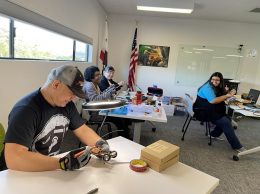Mintz: Personal responsibility and the coronavirus
By Steven Mintz
As the number of COVID-19 cases continue to grow and the death toll mounts, we should use our experiences so far to evaluate our personal responsibilities to each other and whether the government has met its burden in handling the crisis.
Why does this matter? Our society depends on communal efforts to improve the lives of everyone and this can’t be done unless we act responsibly. This goes for the government as well.
There is no doubt the government was not prepared for the virus outbreak in the U.S. Even though China knew about it as far back as December 2019, the government acted as if it knew nothing about the potential risk to citizens of this quick-moving virus. The result is a severe lack of testing kits, insufficient number of ventilators and concern about the number of intensive care unit hospital beds.
The slow response contributed to the need for states and local governments across the country to declare a state of emergency, including Santa Barbara and San Luis Obispo counties, which saw their first cases the past weekend.
The federal government recommended that all gatherings of 50 or more people nationwide be canceled or postponed for eight weeks. In California, Gov. Newsom has said bars, pubs, nightclubs should close and anyone 65 or over and anyone with chronic health conditions should isolate themselves.
We have received mixed messages from our government leaders with Trump downplaying the significance of the outbreak while the scientists are saying we were not prepared and it is a serious matter. Many people rightly wonder whether Trump was being truthful with the American people. Has he lost all credibility? Who should we trust?
Most Americans have acted responsibly with respect to how they have responded to the medical advice to wash their hands and practice social distancing. Others seem to be in panic mode and want to be tested even without the symptoms. A Tennessee man bought 17,700 bottles of hand sanitizer and is being investigated for price-gouging. And then there are those who bought enough toilet paper to last through 2020.
There are other instances of personal irresponsibility. Sheriff’s deputies were called to the Chino Hills Costco in Southern California after shoppers reportedly became angry over the lack of certain items, including bottled water and toilet paper.
An irresponsible passenger got on a Jet Blue plane while awaiting the results of a coronavirus test thereby putting all the passengers and crew at risk. He has been banned from all future Jet Blue flights.
I also wonder what the government’s response and readiness means for a universal health care system. Do we really want the government running our health care? It’s clear they have been incompetent in the current crisis.
The government has had to rely on private companies to help fight the crisis and private facilities for testing. The diagnostics arm of Roche, a large pharmaceutical company, said they expect its specific diagnostic could fuel 400,000 tests per week.
Then there is Google, another private company. In a Rose Garden briefing last week, Trump said that Google was developing a website that could let people evaluate their symptoms and direct them to nearby “drive through” locations for testing. The only problem is no one seemed to have told Google about the announcement before it was made. Google said the project would take some time to develop.
As the virus continues to spread, we need to ask ourselves what limitations on our personal freedom we are willing to accept to minimize the spread of the virus. We have already seen virtually all sporting events shut down, Disneyland and Universal City have ceased all operations, meetings and conferences are being canceled and even Broadway went dark. In other words, are we willing to give up some freedoms for the “greater good?”
Would we be willing to follow the response of China to virtually close off communities and restrict free movement? I have my doubts because we are a very individualistic society and we tend to put our own self-interest first. We’re not like Asian countries that put the interests of their referent group or family unit ahead of personal interest.
We are living in a time of a “new normal.” The restrictions on our activities and physical movement should be a warning that we need to look out for each other and treat each other the way we wish to be treated, the essence of the Golden Rule. If we learn that lesson, then perhaps the coronavirus will help focus our attention on personal responsibility to ourselves and communities.
• Steven Mintz is an ethics expert and professor emeritus from Cal Poly San Luis Obispo.











